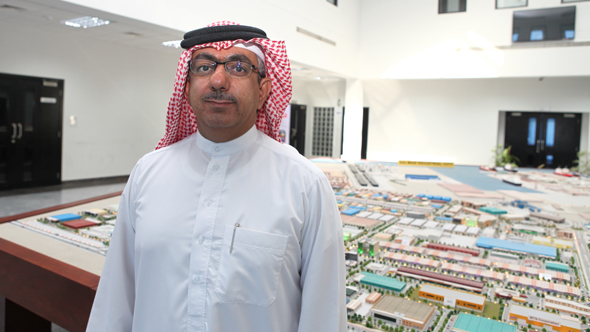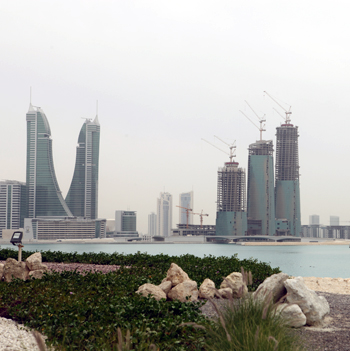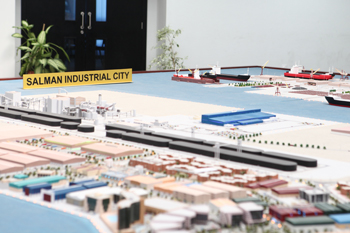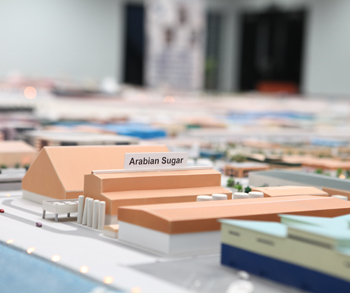Bahrain Industrial Development Strategy: Industry Set to Represent 25% of GDP
Salah Janahi, Director of Industrial Areas Directorate, Ministry of Industry and Commerce
That is why Bahrain has focused on industry, which now contributes 17% to our GDP, and The Ministry of Industry and Commerce is planning to increase this to 25% in the coming years..
Interview with Salah Janahi, Director of Industrial Areas Directorate, Ministry of Industry and Commerce

What is the strategy for the overall industrial development in Bahrain over the next few years.
That is why Bahrain has focused on industry, which now contributes 17% to our GDP, and The Ministry of Industry and Commerce is planning to increase this to 25% in the coming years..
I shall begin by giving an introduction to the topic. 30 years ago Bahrain realised that the oil industry is not the future for Bahrain but instead it is industry and the diversification of all sectors. That is why Bahrain has focused on industry, which now contributes 17% to our GDP, and The Ministry of Industry and Commerce is planning to increase this to 25% in the coming years..
Therefore over the last 30 years the focus has been on industry. Currently we have 8 industrial areas which cover an area of 22 million m2 in different areas of Bahrain. The most recent industrial area is Salman Industrial City, which was inaugurated by his Majesty King Hamad bin Isa Al Khalifa in January 2010.
The size of this industrial area is 12 million m2 and it comprises of three areas: the oldest zone known as Hidd Industrial Area (established in the 1960s) and the 2 newer areas known as Bahrain International Investment Park (BIIP) (established in 2005) and Bahrain Investment Wharf, which is of public and private ownership; the government rented the land to the private sector to develop and reclaim it. This industrial area contains all kinds of investments including industrial activities and other related services.
Why should companies establish themselves here and not in Saudi Arabia which currently has the largest market? What kind of incentives does Bahrain offer to investors and international companies?
Bahrain’s industrial sector provides attractive incentives in comparison to other neighbouring countries. Bahrain provides numerous incentives for industrial areas, many more than what other countries offer.
One of the main incentives is 100% ownership of the project and that all industrial imports of raw material and equipment are tax free. There is also no corporation tax, even if there is any future tax regime, we will guarantee that for 10 years we will not impose any tax on those industrial projects located in BIIP. Other incentives are related to the land rent rate which is very cheap $1.33 per square meter per year, the other attraction is the location of the industrial areas.
We also have duty free exports to all GCC markets, unlike free zones in the region; lastly in BIIP there is no recruitment restrictions for the first five years of operation.
Can you tell us a bit about how the government and the private sector in Bahrain cooperate together, how does it work, how do you feel about it?
I don’t think this is under my scope. What I can say is that there are many areas where we have collaboration. If ever we have any problems or any complaints, we have committee meetings which tackle these issues; this is carried out under Industrial Affairs, there are some other directors who deal with this kind of matters. We always deal with feedback from the industrial sector or from investors themselves but not in industrial areas themselves, in other projects.
What are the long term plans? You mentioned that you are trying to achieve expansion; can you give us some more details?
Our plan is to attract more international investment focusing on exports. We also want the industrial activities to be integrated; for example like what we have in Bahrain International Investment Park, and the fibreglass projects, which are all integrated. We do not wish to have just one standing project that is producing without having any other integration. We are also planning to have other sectors that also have integrated projects.
What would you say are the major challenges that BIIP faces?
This is a very important question. Our main challenge is land scarcity; we are receiving too many applications – both foreign and local – because of the incentives that we offer. However we do not have enough land at the moment. We are studying the requirements and the report has been raised to the government who are trying their best to allocate more land for the industrial sector.
There will be a massive injection of funds coming from the GCC that Bahrain and Oman is going to receive, what expansion do you expect in the industrial sector?
We have some projects that we have raised to the higher levels of the government, one of the projects has already been approved, and others are still being reviewed. All are related to infrastructure development, mainly of the Salman Industrial City but also of other industrial areas.
Do you know the size of the investment?
This information is confidential at this time. 
When we discussed the major challenges of industry with other personalities they identified the government subsidies as the main challenge. The government is currently subsidising electricity and gas which is of course very important for industrial companies. Would you have an outlook for the prices of energy?
We can relate to the land prices but the gas and electricity prices are not under our scope. I know that it is escalating, every year they are trying to reach the model of the international market. The land rate is fixed for all industrial areas, we cannot raise it. We cannot say that it is subsidised as it is applicable to all industrial areas and to all investors. This is a challenge that we have to study from neighbouring countries.
The international financial crisis that happened in 2008 and the events that shook Bahrain in 2011 – have they had any effect on the number of companies looking to set up in Bahrain? Did you feel any resistance?
This is a very good question. In the industrial sector we haven’t felt any resistance because as I said we have received many land applications, and this indicator shows there continues to be a high demand for industrial land. The industrial sector is growing, we haven’t seen any kind of resistance, maybe in 2009 we had a bit of a slowdown but we are continuing to grow, and as I said, the number of applications we receive show that there is more and more demand for industrial land.
The number of applications is increasing?
Yes. What happened in 2011 in Bahrain didn’t affect the international companies, actually we had more companies coming in from Europe, for example from Germany. These companies are all supporting the industrial sector, its expansion, employment and urbanisation.
Have there been any players or companies that left?
As far as I know in the industrial areas no one has left. The companies that left are companies that chose to leave because we could not offer the size of land that they required and not because of the economic crisis or as a result of what happened in Bahrain in 2011.
Is there anything else you think is important to highlight?
At BIIP, we are always focusing on quality projects for the future. We are also focusing on environmental friendly projects and we will continue to do that. The other thing is that we will continue to look for more industrial lands because we know that the future for Bahrain is not in oil and gas,; the future of Bahrain lies in its industry, services and other related sectors.